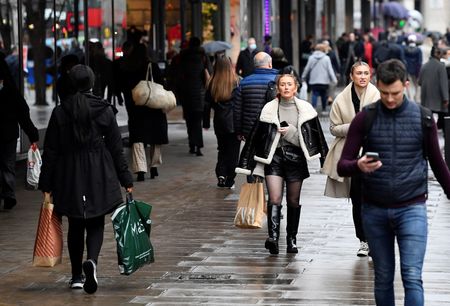By William Schomberg and Ana Nicolaci da Costa
LONDON (Reuters) -British shoppers cut their spending sharply last month and their confidence is close to record lows, underscoring the challenge facing the next prime minister who must also take painful measures to slow fast-rising public borrowing.
Data published on Friday added to signs that Britain’s economy faces a recession which could be deepened by new finance minister Jeremy Hunt’s plans to stem a crisis in financial markets after the brief term of Prime Minister Liz Truss.
Retail sales volumes fell by 1.4% from August – almost three times the 0.5% fall in a Reuters poll of economists – taking them below their pre-coronavirus pandemic level.
Fuel sales were 10% lower than in February 2020 as high prices prompted people cut back on driving to save money.
A one-off bank holiday to mark the funeral of Queen Elizabeth, when many shops closed, also affected the overall figures.
Over the three months to September, sales were down 2.0%, the biggest fall since the three months to September 2021.
“Overall, we think the economy is already in a recession and will be until Q3 2023 with a peak-to-trough drop in GDP of around 2%, similar to the 1990s recession,” said Thomas Pugh, economist at tax and consulting firm RSM UK.
Sterling fell against the U.S. dollar after the data was published.
Consumers have been reining in their spending with inflation hitting 10% and they also face the prospect of a tighter squeeze in 2023 after Hunt said he would scrap tax cuts previously planned by Truss.
She announced on Thursday that she would resign, starting the process of finding a new prime minister by next week.
A survey published overnight showed consumer confidence remained close to a record low as households responded to the combination of high inflation and Britain’s chaotic politics.
The ONS said it was unable to estimate the extent of the impact of the queen’s funeral on the retail sales figures.
“The decline in sales volumes in most major categories suggests that high inflation is still weighing heavily on spending,” Ruth Gregory, an economist with Capital Economics, a consultancy, said.
Several retailers, including Britain’s biggest supermarket group Tesco and online fashion seller ASOS, have warned about the profit outlook this month as they face higher energy and staff costs, and a weak pound.
In annual terms, total sales volumes were down 6.9%, the ONS said, the biggest fall since May 2020.
BORROWING SET TO BALLOON
Separate ONS data showed Britain borrowed 20.01 billion pounds ($22.37 billion) in September, more than the 17.1 billion pounds expected in the Reuters poll of economists.
So far in the 2022/23 financial year, which began in April, borrowing stands at 72.5 billion pounds, down about 26% from the same period last year but double the level in the April-September period of 2019, before the pandemic.
Carl Emmerson, deputy director of the Institute for Fiscal Studies think-tank, said the deficit was in line with forecasts by Britain’s official budget watchdog but would widen again soon as the government’s expensive energy price subsidies begin.
He said borrowing this year could be almost 200 billion pounds, double the Office for Budget Responsibility’s forecast.
After unfunded tax cuts in the “mini-budget” of Truss and ex-finance minister Kwasi Kwarteng caused a bond market rout, Hunt wants to show investors who dumped British government bonds in recent weeks that he can fix the public finances.
He is due to deliver a budget plan on Oct. 31 which is likely to include spending cuts and further tax increases.
“To stabilise markets, I’ve been clear that protecting our public finances means difficult decisions lie ahead,” Hunt said in a statement after Friday’s figures.
“We will do whatever is necessary to drive down debt in the medium term and to ensure that taxpayers’ money is well spent, putting the public finances on a sustainable path as we grow the economy.”
($1 = 0.8945 pounds)
(Reporting by William Schomberg in London and Ana Nicolaci da Costa in Singapore; Editing by Catherine Evans)

